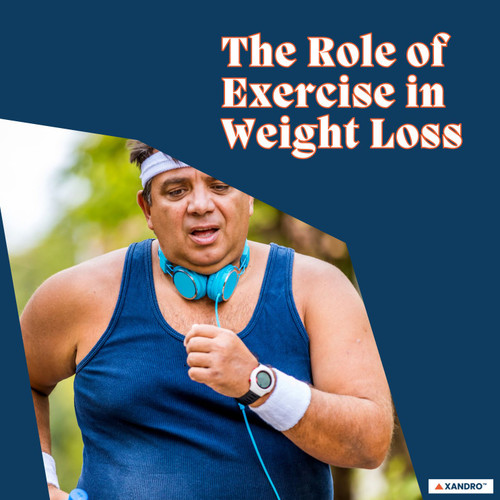The Role of Exercise in Weight Loss: Tips and Benefits
31st Aug 2024
The Role of Exercise in Weight Loss
In order to lead a healthy life, we’re told we need to eat a healthy, balanced diet, sleep enough, reduce our stress and exercise.
It’s what we’ve also spoken about often here at Xandro, as all of your health and longevity strategies should accompany these lifestyle changes.
The same goes for weight loss and then keeping it off. But does exercise reduce weight and should you be focusing more on your exercise routine in your weight loss journey?
This article will go over the role of exercise in weight loss, so jump there now:
- How Much Does Exercise Contribute to Weight Loss?
- What Are Some Weight Loss Exercises?
- Diet and Exercise Tips
- End Note
So, how does exercise help in weight loss?
In most cases, unless you have a condition that causes otherwise, to lose weight, you need to consume fewer calories than you burn. Eating is the consuming part and exercising is the majority of the burning part.
Essentially, this means you need to reduce how much you’re eating (healthily, of course), and move more. We speak about diet and weight loss here, but generally, cutting your daily calories by around 500 to 750 cuts about 0.7kg (1.5 pounds) per week.
Further Reading: Trans-Resveratrol and Weight Loss
How exercise helps you lose weight
For most people, diet affects your weight loss more so than exercise, but physical activity is needed to keep the weight off and increase your metabolism (how many calories you burn).
Exercise is also needed to keep you strong as you lose weight as, as we get older, our muscle mass and bone density reduce, so resistance training helps prevent this.
But why?
To begin with, exercising burns calories. For example, for someone who weighs 73kg, hiking for an hour can make them lose around 438 calories. Leisurely bicycling? 292 calories.
But it’s more than that. Exercise leads to better cardiovascular fitness, glycaemic control of type 2 diabetes, depression, blood pressure and insulin sensitivity, all of which affect your ability to lose weight as well as prevent or even reverse the effects of certain diseases and heart attacks.
Exercise and Appetite
Exercise can influence your appetite, but it might not be in the way you think. While some people believe that working out makes you hungrier, research suggests that exercise can actually suppress your appetite.
For example, studies show that people often eat less on days they exercise compared to days they don't. One study found that participants ate more before a workout than after, leading to an overall reduction in food intake.
Another study showed that short, intense workouts (like HIIT) can significantly reduce appetite, especially in women following low-calorie diets. Morning exercise might also help control hunger better than evening workouts.
Everyone’s response to exercise varies, though, so if you find yourself overeating after long or intense workouts, try shorter or less intense sessions to help manage your appetite and support weight loss.
Can you lose weight just by exercising and not dieting?
Minimally. An exercise and weight loss study, plus reviews of many studies, have found that those who only exercise and don’t make other lifestyle changes experience minimal weight loss. While it improves your fitness, it doesn’t result in a major change in weight.
Further Reading: Supplements for Weight Loss
Exercise guidelines for obesity and weight loss can differ from country to country, but it’s generally recommended to get at least 150 minutes of aerobic activity a week or 75 minutes of vigorous aerobic activity.
Aim for about 300 minutes a week or more of aerobic activity for further health benefits, trying to exercise most days of the week.
It’s also recommended to do strength training at least twice a week, but aerobic training is needed for more significant weight loss changes.
Looking for some activities to lose weight fast?
- Aerobic activity: brisk walking, jogging, swimming, biking, mowing the lawn.
- Vigorous aerobic activity: running, aerobic dancing, heavy hard work
- Pick exercises you enjoy to help you stick to a regular routine.
- If you live close to work, consider walking or riding your bike.
- Take the stairs rather than the escalator or elevator.
- Reduce sugar intake, such as by removing the sugar from your tea or coffee.
- Eat plenty of fruits and vegetables.
- Eat plenty of lean protein and whole grains.
- Drink plenty of water.
Further Reading: Ultimate Guide to Weight Management
There are plenty of health and fitness guidelines floating around, so make sure to have a read of government websites, such as Singapore’s Physical Activity Guidelines.
Have a chat with your doctor to see which exercises would be best for you, especially if you plan on doing vigorous exercise. This is so important for those who have diseases like heart, lung, kidney, diabetes and arthritis, as well as for those who are overweight or have been inactive for numerous months. Jumping straight into vigorous exercise can be detrimental to your health and can cause injury, so you should be slowly building your fitness level.
If you’re interested, you can also read about the role of diet in weight management.
You can also supplement your diet and exercise routine by taking Xandro’s Lean XP, a supplement packed with patented and well-researched ingredients to help you lose weight!
